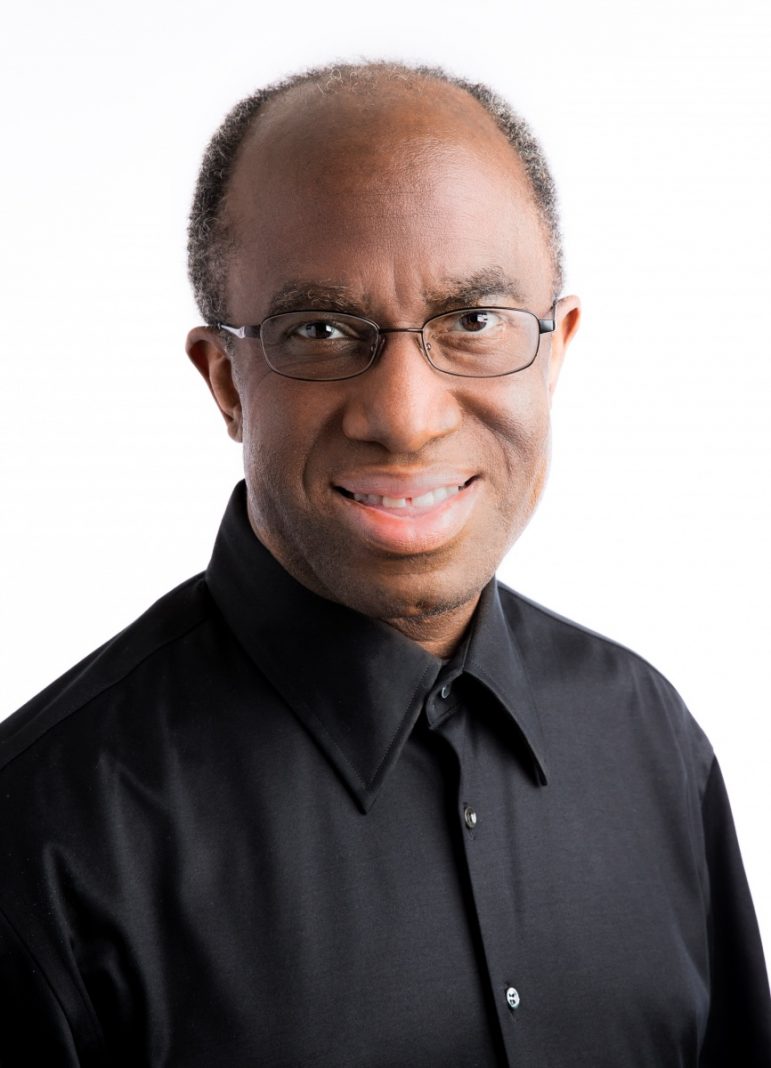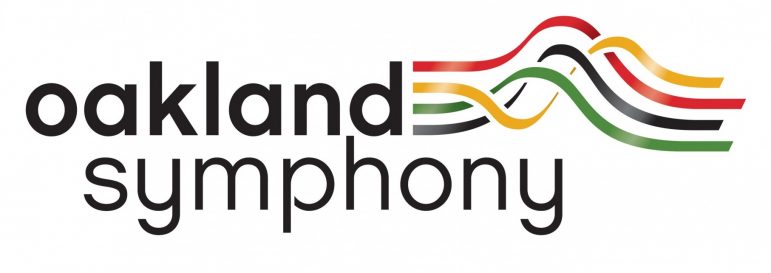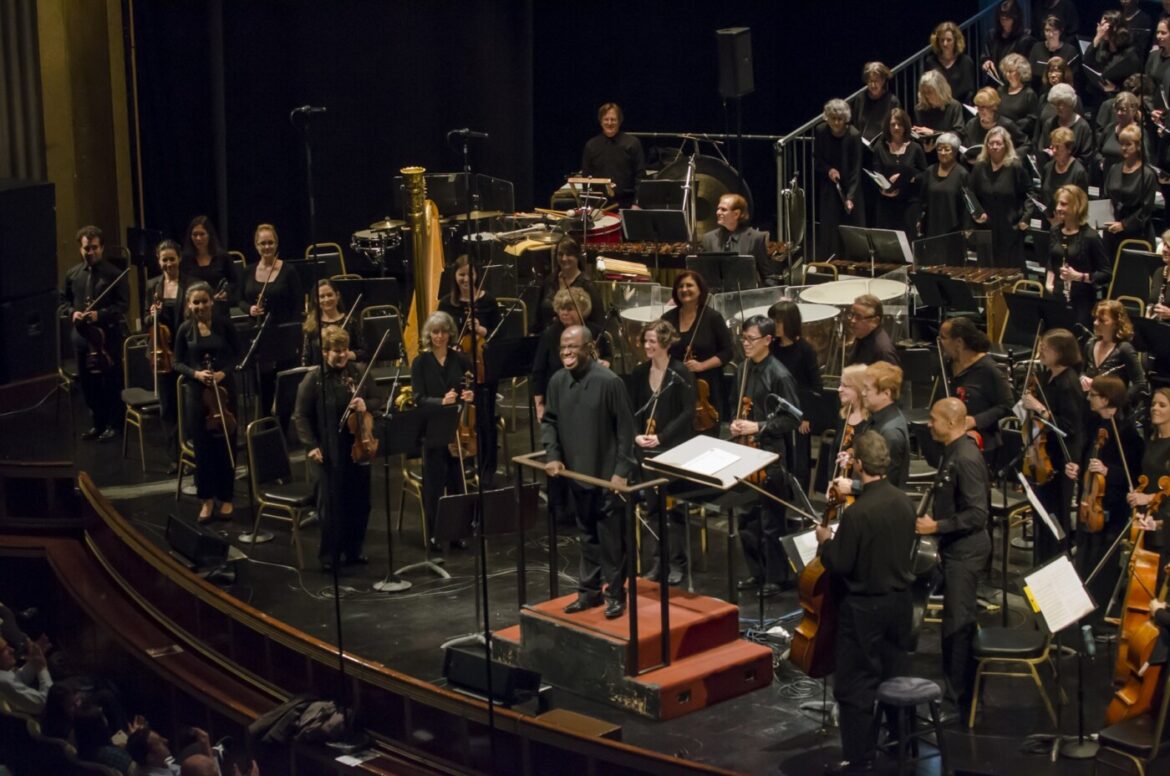Michael Morgan, the longtime music director of the Oakland Symphony, died on August 20 in Oakland, California. He was 63.
His publicist, Marshall Lamm, confirmed the conductor’s death, saying the cause was complications from a recent kidney transplant.
The news brought a wave of grief throughout the Bay Area music community and beyond. San Francisco composer Jake Heggie, who worked with Morgan on a number of projects, expressed shock at the news of the conductor’s death in an email message.

Morgan’s death is “an immense loss for the concert world and for all of us who loved and admired him,” Heggie wrote. “He exuded goodness and demanded the best of everyone; he also knew how to elicit the best, because when you worked with him, you wanted to give your all.”
Morgan’s contributions to Bay Area music were many. In addition to his work with the Oakland Symphony and Oakland Symphony Youth Orchestra, he conducted throughout the Bay Area and beyond, serving in leadership roles with organizations including Festival Opera in Walnut Creek. He was music director of the Bear Valley Music Festival and Gateways Music Festival, and music director emeritus of the Sacramento Philharmonic Orchestra. One of his last appearances was as guest conductor with the San Francisco Symphony. He also served on the boards of the Oaktown Jazz Workshops and the Purple Silk Music Education Foundation.
But it was in his work in Oakland, where he resided for many years, that Morgan made his most significant contributions. In 1988, he joined the organization – then the Oakland East Bay Symphony – as music director. Updating its profile with an innovative mix of classical, Romantic, and American works and programs that welcomed artists from the world of pop, soul, hip-hop and world music, his approach made the Paramount Theatre a destination for music lovers.
During his tenure with the orchestra, Morgan often presided over programs that combined standards of the repertoire with appearances by special guests: guitarist Carlos Santana, soul icon Isaac Hayes, Indian sitar master Ravi Shankar, and rapper Kev Choice were featured in programs that drew new audiences to the Paramount. With his Side by Side programs, Morgan brought non-musical players he admired to the stage – labor organizer Dolores Huerta, comedian-activist W. Kamau Bell, civic leader Bernard J. Tyson – to talk about music that influenced them. He also conducted annual Fourth of July concerts at Richmond’s Craneway Pavilion, bringing local heroes such as National Park Service ranger Betty Reid Soskin to the stage. He was uncommonly attuned to his city’s struggles; in 2018, he dedicated a concert to the 36 “artists and dreamers” who perished in the devastating Ghost Ship fire.
His initiatives at Oakland Symphony also included series featuring neglected 19th century music, and an “American Masterworks” series that presented concert performances of music from “West Side Story,” “Candide,” and “Street Scene.”
Throughout, Morgan remained a committed advocate for music education, working with the Oakland Symphony Youth Orchestra, expanding the Symphony’s MUSE (Music for Excellence) initiative and promoting outreach programs in local schools. He also taught at the San Francisco Conservatory of Music.
Michael Morgan was born in Washington, DC, where he attended public schools. He began conducting at age 12, and later attended Oberlin College Conservatory of Music. He spent a summer at the Berkshire Music Center at Tanglewood, where his teachers included conductors Gunther Schuller and Seiju Ozawa; his operatic debut was in 1982 at the Vienna State Opera, conducting Mozart’s “The Abduction from the Seraglio.” Another mentor, Georg Solti, chose him to be an assistant conductor of the Chicago Symphony Orchestra, a post Morgan held for seven years.
His greatest influence came in 1986, when he met Leonard Bernstein, and the great composer-conductor invited him to make his debut with the New York Philharmonic. Assignments at New York City Opera, St. Louis Opera Theater and Washington National Opera followed.

Morgan never forgot the value of those mentorships, and he mentored those he worked with in turn, said Dr. Lynne Morrow, the Oakland Symphony’s longtime Chorus Director.
“Michael Morgan has been my mentor and my champion,” Morrow said in a call from Sonoma State University, where she teaches in the Voice, Opera, and Music Theater programs. “He has been a mentor and a champion to many.”
Morrow, who described Morgan’s work as “deeply knowledgeable, insightful, and intensely creative in terms of pairing works,” worked with the conductor on a number of projects, both at the Oakland Symphony and at Festival Opera. Their collaborations included Symphony performances of Bernstein’s “Mass,” Gershwin’s “Porgy and Bess,” and the organization’s annual holiday “Let Us Break Bread Together” concert.
Morgan joined Festival Opera in 1995, initially as an artistic advisor and in 1997 assuming the roles of music and artistic director, roles he continued in until 2013. During his directorship, he conducted a range of productions for the company, including a modern-dress staging of Mozart’s “Don Giovanni” and a radiant production of Ned Rorem’s “Our Town,” along with productions of Britten’s “A Midsummer Night’s Dream” and Gounod’s “Faust.” After ceding the company’s top post in 2013, he remained engaged as an artistic advisor.
Zachary Gordin, who succeeded Morgan as Festival Opera’s general director, said that Morgan was essential to paving his way into the company’s leadership role. He was also an uncommonly empathetic conductor, he said. Gordin, a baritone, sang in productions conducted by Morgan in Oakland and Sacramento, noted that Morgan’s guidance was invaluable. “As a conductor, he was telepathic,” said Gordin, “always warm and supportive. We knew he would support us, breathe with us.”
Recalling their collaborations, Morgan’s colleagues said that the conductor’s contributions to Bay Area life were both precious and unparalleled.
“There is no understudy for Michael Morgan,” said Morrow. “His work in the symphonic community and the opera community is understood to be peerless. His legacy continues, and will continue on.”
Morgan is survived by his mother, Mabel Morgan, and his sister, Jacquelyn Morgan, both of Oakland. A memorial service will be announced at a later date.
